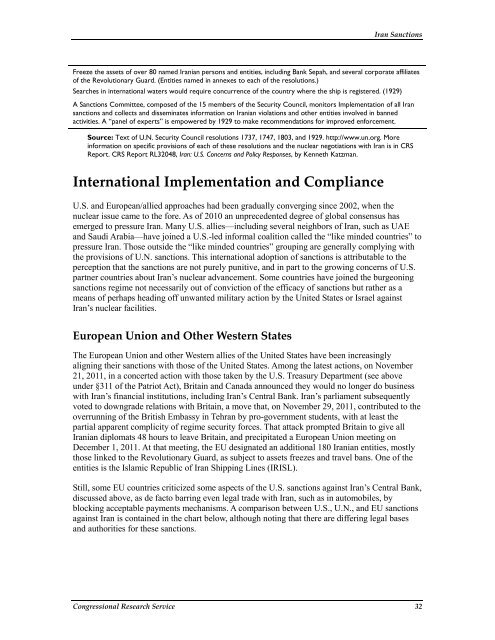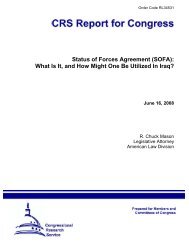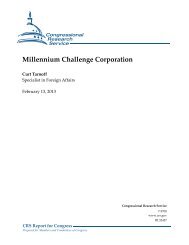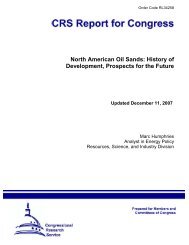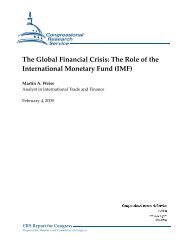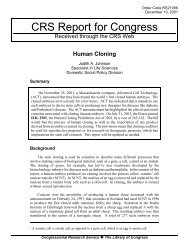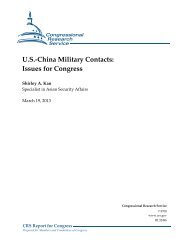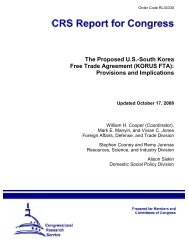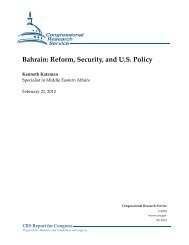Iran Sanctions - Foreign Press Centers
Iran Sanctions - Foreign Press Centers
Iran Sanctions - Foreign Press Centers
You also want an ePaper? Increase the reach of your titles
YUMPU automatically turns print PDFs into web optimized ePapers that Google loves.
<strong>Iran</strong> <strong>Sanctions</strong><br />
Freeze the assets of over 80 named <strong>Iran</strong>ian persons and entities, including Bank Sepah, and several corporate affiliates<br />
of the Revolutionary Guard. (Entities named in annexes to each of the resolutions.)<br />
Searches in international waters would require concurrence of the country where the ship is registered. (1929)<br />
A <strong>Sanctions</strong> Committee, composed of the 15 members of the Security Council, monitors Implementation of all <strong>Iran</strong><br />
sanctions and collects and disseminates information on <strong>Iran</strong>ian violations and other entities involved in banned<br />
activities. A “panel of experts” is empowered by 1929 to make recommendations for improved enforcement.<br />
Source: Text of U.N. Security Council resolutions 1737, 1747, 1803, and 1929. http://www.un.org. More<br />
information on specific provisions of each of these resolutions and the nuclear negotiations with <strong>Iran</strong> is in CRS<br />
Report. CRS Report RL32048, <strong>Iran</strong>: U.S. Concerns and Policy Responses, by Kenneth Katzman.<br />
International Implementation and Compliance<br />
U.S. and European/allied approaches had been gradually converging since 2002, when the<br />
nuclear issue came to the fore. As of 2010 an unprecedented degree of global consensus has<br />
emerged to pressure <strong>Iran</strong>. Many U.S. allies—including several neighbors of <strong>Iran</strong>, such as UAE<br />
and Saudi Arabia—have joined a U.S.-led informal coalition called the “like minded countries” to<br />
pressure <strong>Iran</strong>. Those outside the “like minded countries” grouping are generally complying with<br />
the provisions of U.N. sanctions. This international adoption of sanctions is attributable to the<br />
perception that the sanctions are not purely punitive, and in part to the growing concerns of U.S.<br />
partner countries about <strong>Iran</strong>’s nuclear advancement. Some countries have joined the burgeoning<br />
sanctions regime not necessarily out of conviction of the efficacy of sanctions but rather as a<br />
means of perhaps heading off unwanted military action by the United States or Israel against<br />
<strong>Iran</strong>’s nuclear facilities.<br />
European Union and Other Western States<br />
The European Union and other Western allies of the United States have been increasingly<br />
aligning their sanctions with those of the United States. Among the latest actions, on November<br />
21, 2011, in a concerted action with those taken by the U.S. Treasury Department (see above<br />
under §311 of the Patriot Act), Britain and Canada announced they would no longer do business<br />
with <strong>Iran</strong>’s financial institutions, including <strong>Iran</strong>’s Central Bank. <strong>Iran</strong>’s parliament subsequently<br />
voted to downgrade relations with Britain, a move that, on November 29, 2011, contributed to the<br />
overrunning of the British Embassy in Tehran by pro-government students, with at least the<br />
partial apparent complicity of regime security forces. That attack prompted Britain to give all<br />
<strong>Iran</strong>ian diplomats 48 hours to leave Britain, and precipitated a European Union meeting on<br />
December 1, 2011. At that meeting, the EU designated an additional 180 <strong>Iran</strong>ian entities, mostly<br />
those linked to the Revolutionary Guard, as subject to assets freezes and travel bans. One of the<br />
entities is the Islamic Republic of <strong>Iran</strong> Shipping Lines (IRISL).<br />
Still, some EU countries criticized some aspects of the U.S. sanctions against <strong>Iran</strong>’s Central Bank,<br />
discussed above, as de facto barring even legal trade with <strong>Iran</strong>, such as in automobiles, by<br />
blocking acceptable payments mechanisms. A comparison between U.S., U.N., and EU sanctions<br />
against <strong>Iran</strong> is contained in the chart below, although noting that there are differing legal bases<br />
and authorities for these sanctions.<br />
Congressional Research Service 32


